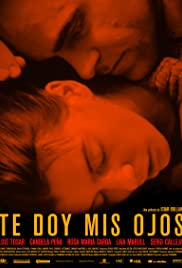
TE DOIMIS OJOS (TAKE MY EYES)
Spain, 2003, 109 minutes, Colour.
Laia Marull, Luis Tosar, Candela Pena, Rosa Maria Sarda.
Directed by Iciar Bollain.
Take My Eyes is a phrase used by the wife in this film in giving herself completely to her husband, offering him everything, including her eyes.
However, the film is about domestic abuse. It begins with a mother fleeing the house in the middle of the night with her young son. She takes refuge with others – and has to withstand the attempts of her rather brutish husband who wants her back. The film also emphasises the relationship of the woman with her friends, their attitude towards marriage and break-up, towards domestic violence and the role of males.
The performances of the leading actors are very powerful. The film was co-written and directed by actress Iciar Bollain. After working as an actress for many years, from her teenage years, she moved into writing and directing. A mother of two children herself, the film offers insights into marriage, marital relationships, violence and brutality, sexuality – and the consequences for each of those involved, especially the child.
The film won many awards, including best film in the Spanish film awards. It also won a prize from the World Catholic Association for Communications, SIGNIS.
1.The impact of the film? For women? Men? Its many Spanish awards? Its speaking to a Spanish audience? Universal audience?
2.Universal problems, wife-bashing, domestic abuse? Men and their stances, women as victims? Men as victims? Spanish macho attitudes, expectations? Violence taken for granted? The possibilities for counselling, psychologists? Recovery of marriage? Impact on family, children? The particularly Spanish tone of the film?
3.The Toledo settings, its historic and artistic past, the present? Art and traditions? Modern life and style? The modern settings, buildings?
4.The use of artistic myths, Greek myths, Orpheus, Danae and Jupiter? The Madonnas? The churches? The paintings of El Greco? The visual presentation of the art, the contemporary narrative paralleling the myths? Museums, tours and explanations?
5.The title, the original idea of a woman surrendering everything to her brutal husband? Pilar and her saying it during the sexual encounter? The ideal, actual?
6.Audiences identifying with Pilar, with Antonio, with Ana, with Aurora, with Juan?
7.The opening, its desperation, Pilar taking the sleepy boy, still wearing her slippers, the bus? Waking up Ana, staying, her being upset? Juan and the sudden change? What to say or what not to say? Settling down, going for the job interviews, getting the job, at the ticket box, in the cathedral, the sense of holiness and majesty, awe? With her friends, lunches, chatter, a new life?
8.The portrait of Ana, information about her wedding, Aurora and her coming to stay, the discussions, the wedding dress, the details of the wedding? Ana and her willingness to mind Juan? Her change, the wedding itself, Pilar throwing the wedding dress over the roof? Pilar’s outburst against her sister, her resentments? Grief, Ana’s reaction, the need to be reconciled? Her mother, her point of view about her own marriage, her daughter’s? The brutality of their father? The cemetery visits, the mother’s story about her wanting to visit her brother and her husband forbidding it? The plain talk about her mother’s self-centredness, wanting to be a martyr? The impact for Pilar’s decision? The title of the film and its illustrated by these three marriages?
9.Pilar in herself, her background, the nine years’ marriage? Her changing, going to lunch, sense of freedom? The bonding with her son? With Ana and Ana’s not understanding? Her fear, anger? Her fear of Antonio, the physical repercussions, his leaving the gifts, going back to him, the sexual encounter and its explicitness? And yet his continued anger? The plan for the job with the other women, the wedding and her clash with Ana, going home with Antonio and Juan? Wanting to do the course, Antonio’s reaction? Getting the job, his criticism that she never had her mobile phone on? At home, cooking, helping Juan with his homework? The success with the tours and the explanations of the paintings?
10.Antonio, his reaction to Pilar’s leaving, Ana coming for the clothes, her discovering the hospital records of Pilar’s injuries? Seeing Antonio at work, the refrigerators, the practical world? His visits, stalking Pilar, playing ball with his son, telling his son not to tell lies, looking into his eyes? His coming to visit, Pilar avoiding him? His leaving the flower, the gifts? Her wearing the earrings? The wedding, her going with him, the sex scene, his attitudes and angers? His continued suspicions, the mobile phones? Going for the weekend to help his brother building, his brother’s reaction, his anger about the money, kicking the car? Frightening Pilar and Juan?
11.The therapy sequences, the leader and his abilities, the range of men at the session, the examples of their brutality, macho attitudes taken for granted? The role-plays? Their talk, Antonio being inarticulate, his going to visit the therapist privately, the therapist’s technique in putting Antonio in touch with his feelings, self-image? His writing in the diary, its red pages? His going to the tour and listening to Pilar’s explanations? His interpretation, thinking she wanted to be exposed to people, his physically exposing her on the balcony and humiliating her? His continued apologies? His inability to control himself? Pilar unable to take anything any more – coming with her friends to collect her clothes and possessions?
12.Juan, his age, being taken in the night, having to settle with his aunt, his mother and the homework, his father’s visits, his father intimidating him? The return home? A future?
13.The portrait of the women, their help to Pilar, the lunch conversations, the wedding, the job, the interviews, their skills?
14.A serious look at contemporary problems of domestic abuse?